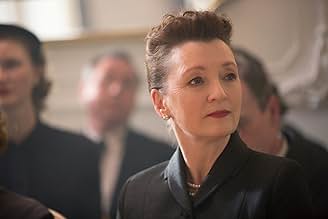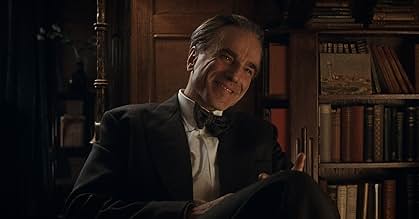Nella Londra del 1950, Reynolds Woodcock è un sarto rinomato la cui vita meticolosa è sconvolta da Alma, una giovane donna con una grande forza di volontà, che diventa la sua musa e il suo a... Leggi tuttoNella Londra del 1950, Reynolds Woodcock è un sarto rinomato la cui vita meticolosa è sconvolta da Alma, una giovane donna con una grande forza di volontà, che diventa la sua musa e il suo amore.Nella Londra del 1950, Reynolds Woodcock è un sarto rinomato la cui vita meticolosa è sconvolta da Alma, una giovane donna con una grande forza di volontà, che diventa la sua musa e il suo amore.
- Regia
- Sceneggiatura
- Star
- Vincitore di 1 Oscar
- 55 vittorie e 121 candidature totali
Recensioni in evidenza
This is obviously a carefully crafted film: from the scenes, the acting, the words, the clothes, the facial and body movements, the music, it is all careful and artistic. That being said, it is terribly descriptive: an obsessive dress maker finds his muse in a strange woman who wants him to be hers alone. There is nothing else, just their play back and forth, and then the film ends. If you are here for the quality of film making, then you will probably like the film. If you want some insight into human psyche, this is a good film to learn from, with actors as dedicated as Lewis, Manville and Krieps. If you are looking for an interesting story that fills you with emotion and teaches you new things, you may be disappointed.
It doesn't help that neither of the characters in this film is even remotely relatable. Lewis' character is the typical obsessive genius that is careless of others and focuses on his work above all else. Yet he is not that much of a genius, just a failed human being with some temporary success and weird fetishes. Manville's character is a stern woman who's only purpose in life seems to care for Lewis to the point of losing herself, to keep things in balance when his histrionics threaten "the house". Krieps' character is plain creepy. If you want something to make you fear women, this is a great start. She is concomitantly lovely and well intentioned and borderline psychotic.
Bottom line: a very technical and artistic study on a rather boring subject and some unrelatable people.
It doesn't help that neither of the characters in this film is even remotely relatable. Lewis' character is the typical obsessive genius that is careless of others and focuses on his work above all else. Yet he is not that much of a genius, just a failed human being with some temporary success and weird fetishes. Manville's character is a stern woman who's only purpose in life seems to care for Lewis to the point of losing herself, to keep things in balance when his histrionics threaten "the house". Krieps' character is plain creepy. If you want something to make you fear women, this is a great start. She is concomitantly lovely and well intentioned and borderline psychotic.
Bottom line: a very technical and artistic study on a rather boring subject and some unrelatable people.
First of all - what a cowboy name for a designer!
I like the title letters, they are like the endless knot. And so is this movie. It leads nowhere, but strangely finds a cure for sociopaths. Give them a little bit of their own poison and you will live happily ever after. Maybe. This notion is the best that this film gives you, even better than the production design. I really liked the wallpapers so I won't complain about the production value, style over substance, and so on. It's brave to try to cover the truth with lots of lace and chiffon to make it watchable because the result may be pretentious and boring. And then if the truth isn't necessarily cathartic, the mushrooms are. But, to like the film I need to like the characters and they are not likable. I can't imagine what he sees in her or what she sees in him. The motif of poisonous love games and the uncertainty of love has been better used by François Truffaut in his Mississippi Mermaid (1969).
The alleged acting swan-song of Daniel Day-Lewis ("Lincoln") sees him deliver a brilliantly intense portrayal of a maestro in his craft with all the quirks and egotistical faults that come with that position.
Reynolds Woodcock is the craftsman behind a world-renowned 1950's fashion house, in demand from the elite classes and even royalty. He has a magnetic personality, is overtly self-confident, obsessive, a cruel bully and treats his girlfriends as chattels that he can tire of and dismiss from his life without a backward glance. Trying to keep the business and Reynolds on track, with ruthless efficiency, is his sister Cyril (Leslie Manville, "Maleficent").
Looking for his next conquest during a trip to his seaside residence, he reels in blushing young waitress Alma (Vicky Krieps, "The Colony"). But he gets more than he bargains for.
This is a really exquisite and gentle film. Aside from some dubious fungi-related practices, there is no violence, no sex and - aside from about half a dozen well-chosen F-words - limited swearing (of which more below). This is a study of the developing relationship between the two protagonists, with little in the way of plot. Sounds dull? Far from it. This is two hours that flew by.
What it also features is (yet) another example of extremely strong women asserting their power. A scene (well trailed in Manville's award snippets) where Cyril firmly puts Reynolds back in his box is brilliant: a real turning of tables with Woodcock meekly falling into line. And Alma makes for an incredibly rich and complicated character, one of the most interesting female roles I've seen this year so far.
It's a stellar acting performance from Day-Lewis, and while Oldman fully deserves all of his award kudos for "Darkest Hour", Day-Lewis delivers the goods without any of the make-up. It feels like Day-Lewis is a long way down the betting odds this year because "he always gets one". He certainly gets my vote ahead of all of the other three nominees.
Kreips - not an actress I know - also brilliantly holds her own, and if it wasn't such a strong female field this year she could well have been nominated.
Also worthy of note is the pervasive piano score by (suprisingly) Radiohead's Jonny Greenwood. It's really lovely and counterpoints the rest of the classical score nicely. Its BAFTA and Oscar nominations are both well deserved (though I would expect the Oscar to follow the BAFTA steer with "The Shape of Water").
All in all, this is a real tour de force by writer/director Paul Thomas Anderson ("Inherent Vice", "There Will Be Blood"). How much I enjoyed this film was a surprise to me, since I have no interest in the "fashion industry" (as my family will no doubt be quick to point out!) and I went to see this more out of 'duty' based on its Oscar buzz than because I really wanted to see it.
The big curiosity is why exactly the BBFC decided that this film was worthy of a 15 certificate rather than a 12A. Their comments on the film say "There is strong language ('f**k'), as well as milder terms including 'bloody' and 'hell'. Other issues include mild sex references and scenes of emotional upset. In one scene, a woman's nipples are visible through her slip while she is measured for a dress." For a 12A, the board say "The use of strong language (for example, 'f***') must be infrequent". I didn't count the f-words... but as I said I don't think it amounts to more than a half-dozen. Is that "frequent"? And - SHOCK, HORROR... visible covered nipples you say?! Lock up your teenagers! When you look at the gentleness of this film versus the violence within "Black Panther", you have to question this disparity.
Reynolds Woodcock is the craftsman behind a world-renowned 1950's fashion house, in demand from the elite classes and even royalty. He has a magnetic personality, is overtly self-confident, obsessive, a cruel bully and treats his girlfriends as chattels that he can tire of and dismiss from his life without a backward glance. Trying to keep the business and Reynolds on track, with ruthless efficiency, is his sister Cyril (Leslie Manville, "Maleficent").
Looking for his next conquest during a trip to his seaside residence, he reels in blushing young waitress Alma (Vicky Krieps, "The Colony"). But he gets more than he bargains for.
This is a really exquisite and gentle film. Aside from some dubious fungi-related practices, there is no violence, no sex and - aside from about half a dozen well-chosen F-words - limited swearing (of which more below). This is a study of the developing relationship between the two protagonists, with little in the way of plot. Sounds dull? Far from it. This is two hours that flew by.
What it also features is (yet) another example of extremely strong women asserting their power. A scene (well trailed in Manville's award snippets) where Cyril firmly puts Reynolds back in his box is brilliant: a real turning of tables with Woodcock meekly falling into line. And Alma makes for an incredibly rich and complicated character, one of the most interesting female roles I've seen this year so far.
It's a stellar acting performance from Day-Lewis, and while Oldman fully deserves all of his award kudos for "Darkest Hour", Day-Lewis delivers the goods without any of the make-up. It feels like Day-Lewis is a long way down the betting odds this year because "he always gets one". He certainly gets my vote ahead of all of the other three nominees.
Kreips - not an actress I know - also brilliantly holds her own, and if it wasn't such a strong female field this year she could well have been nominated.
Also worthy of note is the pervasive piano score by (suprisingly) Radiohead's Jonny Greenwood. It's really lovely and counterpoints the rest of the classical score nicely. Its BAFTA and Oscar nominations are both well deserved (though I would expect the Oscar to follow the BAFTA steer with "The Shape of Water").
All in all, this is a real tour de force by writer/director Paul Thomas Anderson ("Inherent Vice", "There Will Be Blood"). How much I enjoyed this film was a surprise to me, since I have no interest in the "fashion industry" (as my family will no doubt be quick to point out!) and I went to see this more out of 'duty' based on its Oscar buzz than because I really wanted to see it.
The big curiosity is why exactly the BBFC decided that this film was worthy of a 15 certificate rather than a 12A. Their comments on the film say "There is strong language ('f**k'), as well as milder terms including 'bloody' and 'hell'. Other issues include mild sex references and scenes of emotional upset. In one scene, a woman's nipples are visible through her slip while she is measured for a dress." For a 12A, the board say "The use of strong language (for example, 'f***') must be infrequent". I didn't count the f-words... but as I said I don't think it amounts to more than a half-dozen. Is that "frequent"? And - SHOCK, HORROR... visible covered nipples you say?! Lock up your teenagers! When you look at the gentleness of this film versus the violence within "Black Panther", you have to question this disparity.
My Rating : 8/10
This is a delicately executed drama intimately woven around the characters of Daniel Day-Lewis as Reynolds Woodcock and Vicky Krieps as Alma.
Right from the opening shots I was engaged and the brilliant performances, beautiful background music coupled with breathtaking cinematography make this a worthwhile watch if you are in the mood for something slow, something a bit art-y. However if you are not in the mood for something like this it can become a chore to watch so I ask the viewer to understand that it is a very beautiful film and in the right frame of mind you will be absorbed into the world of this renowned mid-twentieth century dressmaker who can be a bit fussy.
Daniel Day-Lewis is at his typical level of brilliance here. He perfectly plays the role of an obsessive personality, who is so averse to letting someone interfere with his work, yet who more and more, through both natural and artificial means, also doesn't want to lose the new woman in his life.
Stylish camera work, wonderfully-paced drama. Solid 8/10.
This is a delicately executed drama intimately woven around the characters of Daniel Day-Lewis as Reynolds Woodcock and Vicky Krieps as Alma.
Right from the opening shots I was engaged and the brilliant performances, beautiful background music coupled with breathtaking cinematography make this a worthwhile watch if you are in the mood for something slow, something a bit art-y. However if you are not in the mood for something like this it can become a chore to watch so I ask the viewer to understand that it is a very beautiful film and in the right frame of mind you will be absorbed into the world of this renowned mid-twentieth century dressmaker who can be a bit fussy.
Daniel Day-Lewis is at his typical level of brilliance here. He perfectly plays the role of an obsessive personality, who is so averse to letting someone interfere with his work, yet who more and more, through both natural and artificial means, also doesn't want to lose the new woman in his life.
Stylish camera work, wonderfully-paced drama. Solid 8/10.
Quiet movies are not usually my thing. I like pace and story and energy. But this film crackles in the quiet. PTA makes every scene feel like a battle, and the actors' performances rise to that challenge. It may be a quiet movie about a dress maker, but it is so much more - a battle of wills, a tension against each seam, a few characters slowly resigning themselves to something other than what they planned. If you described the plot, I would be like, "Really? That is the story?" After watching it, I can say it is not just a story...it is a great story.
Lo sapevi?
- QuizPaul Thomas Anderson got the initial idea for the film while he was sick in bed one day. His wife, Maya Rudolph, was tending to him and gave him a look that made him realize that she had not looked at him with such tenderness and love in a long time.
- BlooperA character says, "I don't mean to be racist..." That word didn't exist, at least in British English, in the 1950s. Someone might have used "racialist".
- Citazioni
Reynolds Woodcock: Kiss me, my girl, before I'm sick.
- Curiosità sui creditiThe typeface used for the credits is called Reynolds Stone and it was created by English wood engraver, typographer, and designer Reynolds Stone, who was a close friend of the parents of Daniel Day-Lewis.
- ConnessioniFeatured in The 75th Annual Golden Globe Awards (2018)
- Colonne sonoreMy Foolish Heart
Written by Ned Washington and Victor Young
Performed by Oscar Peterson
Courtesy of The Verve Music Group
Under license from Universal Music Enterprises
I più visti
Accedi per valutare e creare un elenco di titoli salvati per ottenere consigli personalizzati
- How long is Phantom Thread?Powered by Alexa
Dettagli
- Data di uscita
- Paesi di origine
- Siti ufficiali
- Lingue
- Celebre anche come
- El hilo fantasma
- Luoghi delle riprese
- Victoria Hotel, Station Road, Robin Hood's Bay, Whitby, North Yorkshire, Inghilterra, Regno Unito(where Reynolds meets Alma)
- Aziende produttrici
- Vedi altri crediti dell’azienda su IMDbPro
Botteghino
- Budget
- 35.000.000 USD (previsto)
- Lordo Stati Uniti e Canada
- 21.198.205 USD
- Fine settimana di apertura Stati Uniti e Canada
- 216.495 USD
- 31 dic 2017
- Lordo in tutto il mondo
- 52.204.454 USD
- Tempo di esecuzione2 ore 10 minuti
- Colore
- Mix di suoni
- Proporzioni
- 1.85 : 1
Contribuisci a questa pagina
Suggerisci una modifica o aggiungi i contenuti mancanti































